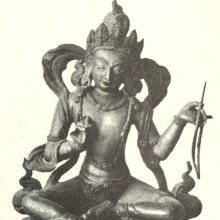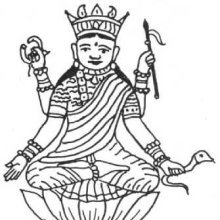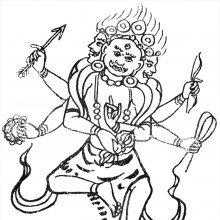Shrinkhala, Śṛṅkhalā, Śṛṅkhala, Śṛṃkhalā, Śṛṃkhala: 18 definitions
Introduction:
Shrinkhala means something in Buddhism, Pali, Hinduism, Sanskrit, Jainism, Prakrit, Marathi. If you want to know the exact meaning, history, etymology or English translation of this term then check out the descriptions on this page. Add your comment or reference to a book if you want to contribute to this summary article.
The Sanskrit terms Śṛṅkhalā and Śṛṅkhala and Śṛṃkhalā and Śṛṃkhala can be transliterated into English as Srnkhala or Shrinkhala or Srmkhala or Shrimkhala, using the IAST transliteration scheme (?).
Images (photo gallery)
In Hinduism
Ayurveda (science of life)
Rasashastra (Alchemy and Herbo-Mineral preparations)
Source: Wisdom Library: Rasa-śāstraŚṛṅkhalā (शृङ्खला) or Śṛṃkhalā (शृंखला):—One of the sixty-eight Siddhauṣadhi, as per Rasaśāstra texts (rasa literature). These drugs give siddhi (success) in mercurial operations. Even so, they are more powerful than rasa (mercury) itself. These may perform all the kāryas (‘effects’) and grant dehasiddhi (‘perfection of body’) and lohasiddhi (‘transmutation of base metals’) both.
Nighantu (Synonyms and Characteristics of Drugs and technical terms)
Source: WorldCat: Rāj nighaṇṭuŚṛṅkhalā (शृङ्खला) is another name for Kokilākṣa, a medicinal plant identified with Astercantha longifolia Nees., a synonym of synonym of Hygrophila auriculata (Schumach.) Heine from the Acanthaceae or “acanthus” family of flowering plants, according to verse 4.191-193 of the 13th-century Raj Nighantu or Rājanighaṇṭu. The fourth chapter (śatāhvādi-varga) of this book enumerates eighty varieties of small plants (pṛthu-kṣupa). Together with the names Śṛṅkhalā and Kokilākṣa, there are a total of fourteen Sanskrit synonyms identified for this plant.
Toxicology (Study and Treatment of poison)
Source: Shodhganga: Kasyapa Samhita—Text on Visha ChikitsaŚṛṅkhala (शृङ्खल) refers to a certain type of rat poison, the treatment of which is described in the Kāśyapa Saṃhitā: an ancient Sanskrit text from the Pāñcarātra tradition dealing with both Tantra and Viṣacikitsā—an important topic from Āyurveda which deals with the study of Toxicology (Viṣavidyā or Sarpavidyā).

Āyurveda (आयुर्वेद, ayurveda) is a branch of Indian science dealing with medicine, herbalism, taxology, anatomy, surgery, alchemy and related topics. Traditional practice of Āyurveda in ancient India dates back to at least the first millenium BC. Literature is commonly written in Sanskrit using various poetic metres.
Vastushastra (architecture)
Source: Brill: Śaivism and the Tantric Traditions (architecture)Śṛṅkhalā (शृङ्खला) refers to an “(iron) chain”, according to the Devyāmata (in the section śalyoddhāra-paṭala or “excavation of extraneous substances”).—Accordingly, “[...] If [someone] touches a part of his body, [the officiant] should prognosticate an extraneous thing [at a depth] up to the part. If [someone] touches his neck, they know that there is [an extraneous thing] which is an iron chain (śṛṅkhalā-lohaja). It should be understood that that iron chain (śṛṅkhalā) [exists at a depth of] three cubits [underground]. There is no doubt about it. [...]”.

Vastushastra (वास्तुशास्त्र, vāstuśāstra) refers to the ancient Indian science (shastra) of architecture (vastu), dealing with topics such architecture, sculpture, town-building, fort building and various other constructions. Vastu also deals with the philosophy of the architectural relation with the cosmic universe.
In Buddhism
Tibetan Buddhism (Vajrayana or tantric Buddhism)
Source: Wisdom Library: Tibetan BuddhismŚṛṅkhalā (शृङ्खला) is the name of Dūtī (i.e., messengers of Lord Vajrapāṇi) mentioned as attending the teachings in the 6th century Mañjuśrīmūlakalpa: one of the largest Kriyā Tantras devoted to Mañjuśrī (the Bodhisattva of wisdom) representing an encyclopedia of knowledge primarily concerned with ritualistic elements in Buddhism. The teachings in this text originate from Mañjuśrī and were taught to and by Buddha Śākyamuni in the presence of a large audience (including Śṛṅkhalā).
Source: academia.edu: The Structure and Meanings of the Heruka MaṇḍalaŚṛṅkhalā (शृङ्खला) refers to a “shackle” and represents one of the items held in the left hand of Heruka: one of the main deities of the Herukamaṇḍala described in the 10th century Ḍākārṇava chapter 15. Heruka is positioned in the Lotus (padma) at the center; He is the origin of all heroes; He has 17 faces (with three eyes on each) and 76 arms [holding, for example, śṛṅkhalā]; He is half black and half green in color; He is dancing on a flaming sun placed on Bhairava and Kālarātrī.

Tibetan Buddhism includes schools such as Nyingma, Kadampa, Kagyu and Gelug. Their primary canon of literature is divided in two broad categories: The Kangyur, which consists of Buddha’s words, and the Tengyur, which includes commentaries from various sources. Esotericism and tantra techniques (vajrayāna) are collected indepently.
In Jainism
General definition (in Jainism)
Source: archive.org: The Jaina IconographyŚṛṃkhalā (शृंखला) refers to a “chain” and represents an object held in the hand of Vajraśṛṃkhalā or Kālī: the Yakṣiṇī accompanying Abhinandananātha: the fourth of twenty-four Tīrthaṃkaras or Jinas, commonly depicted in Jaina iconography.—[...] Kālī also assumes some symbols as becoming Vidyādevī such as Varada and Nāga, and other symbols of noose and goad as they should belong to a Yakṣiṇī. When we treat Vajra-śṛṃkhalā as a Vidyādevī, we shall see, she holds actually a Śṛṃkhalā or chain, which may explain as the origin of her name.

Jainism is an Indian religion of Dharma whose doctrine revolves around harmlessness (ahimsa) towards every living being. The two major branches (Digambara and Svetambara) of Jainism stimulate self-control (or, shramana, ‘self-reliance’) and spiritual development through a path of peace for the soul to progess to the ultimate goal.
Languages of India and abroad
Marathi-English dictionary
Source: DDSA: The Molesworth Marathi and English Dictionaryśṛṅkhalā (शृंखला).—f S pop. śṛṅkhaḷā f A chain.
Source: DDSA: The Aryabhusan school dictionary, Marathi-Englishśṛṅkhalā (शृंखला) [-ḷā, -ळा].—f A chain.
Marathi is an Indo-European language having over 70 million native speakers people in (predominantly) Maharashtra India. Marathi, like many other Indo-Aryan languages, evolved from early forms of Prakrit, which itself is a subset of Sanskrit, one of the most ancient languages of the world.
Sanskrit dictionary
Source: DDSA: The practical Sanskrit-English dictionaryŚṛṅkhala (शृङ्खल) or Śṛṅkhalā (शृङ्खला).—[śṛṅgāt prādhānyāt skhalyate anena pṛṣo° Tv.]
1) An iron-chain, fetter.
2) A chain, fetter in general (fig. also); अन्यैरप्यायतं नेहुर्वरत्राशृङ्खलादिभिः (anyairapyāyataṃ nehurvaratrāśṛṅkhalādibhiḥ) Bhaṭṭikāvya 9.9; लीलाकटाक्षमालाशृङ्खलाभिः (līlākaṭākṣamālāśṛṅkhalābhiḥ) Dk.; संसारवासनाबद्धशृङ्खलाम् (saṃsāravāsanābaddhaśṛṅkhalām) Gītagovinda 3.
3) A chain for tying the feet of an elephant; स्तम्बेरमा मुखरशृङ्खलकर्षिणस्ते (stamberamā mukharaśṛṅkhalakarṣiṇaste) R.5.72; Kirātārjunīya 7.31.
4) A chain or belt worn round the waist.
5) A measuring chain.
6) A chain, series, succession.
Derivable forms: śṛṅkhalaḥ (शृङ्खलः), śṛṅkhalam (शृङ्खलम्).
Source: Cologne Digital Sanskrit Dictionaries: Shabda-Sagara Sanskrit-English DictionaryŚṛṅkhala (शृङ्खल).—Subst. mfn.
(-laḥ-lā-laṃ) 1. A belt or chain worn round a man’s body. 2. A chain for confining an elephant. 3. A chain, a fetter in general. E. śṛṅga a horn, here said to mean a link, and khal to collect, aff. ac; or śiñjā the tinkling of a chain, and skhal to go, aff. ac, deriv irr.
Source: Cologne Digital Sanskrit Dictionaries: Benfey Sanskrit-English DictionaryŚṛṅkhala (शृङ्खल).—m., f. lā, and n. 1. A chain, [Daśakumāracarita] in
Śṛṅkhala (शृङ्खल).—[substantive], ā [feminine] chain, fetter.
Source: Cologne Digital Sanskrit Dictionaries: Monier-Williams Sanskrit-English Dictionary1) Śṛṅkhala (शृङ्खल):—m. n. (derivation doubtful) a chain, fetter ([especially] for confining the feet of an elephant), [Raghuvaṃśa; Purāṇa]
2) a man’s belt, [cf. Lexicographers, esp. such as amarasiṃha, halāyudha, hemacandra, etc.]
3) a measuring chain, [Monier-Williams’ Sanskrit-English Dictionary]
4) f(ā and ī). See below.
5) Śṛṅkhalā (शृङ्खला):—[from śṛṅkhala] f. a chain, fetter etc. (= śṛṅkhala), [Kāvya literature; Varāha-mihira’s Bṛhat-saṃhitā etc.]
Source: Cologne Digital Sanskrit Dictionaries: Yates Sanskrit-English DictionaryŚṛṅkhala (शृङ्खल):—[(laḥ-lā-laṃ) m. f. n.] A belt; a chain; fetter.
[Sanskrit to German]
Sanskrit, also spelled संस्कृतम् (saṃskṛtam), is an ancient language of India commonly seen as the grandmother of the Indo-European language family (even English!). Closely allied with Prakrit and Pali, Sanskrit is more exhaustive in both grammar and terms and has the most extensive collection of literature in the world, greatly surpassing its sister-languages Greek and Latin.
Kannada-English dictionary
Source: Alar: Kannada-English corpusŚṛṃkhala (ಶೃಂಖಲ):—[noun] = ಶೃಂಖಲೆ [shrimkhale].
--- OR ---
Śṛṃkhaḷa (ಶೃಂಖಳ):—[noun] = ಶೃಂಖಲೆ [shrimkhale].
Kannada is a Dravidian language (as opposed to the Indo-European language family) mainly spoken in the southwestern region of India.
See also (Relevant definitions)
Starts with: Shrinkhalabaddha, Shrinkhalabaddha-visphota, Shrinkhalabandha, Shrinkhalabandhana, Shrinkhaladaman, Shrinkhalaka, Shrinkhalakalapa, Shrinkhalanyasa, Shrinkhalapasha, Shrinkhalata, Shrinkhalatodin, Shrinkhalatva, Shrinkhalay, Shrinkhalaya, Shrinkhalayamaka.
Ends with: Asthishrinkhala, Chinnashrinkhala, Dipashrinkhala, Himashrinkhala, Kandarpashrinkhala, Katishrinkhala, Lohashrinkhala, Sharishrinkhala, Shraddhamantrashrinkhala, Ucchrinkhala, Vajrashrinkhala, Vajrasthishrinkhala, Vatashrinkhala, Vishnushrinkhala, Vishrinkhala.
Full-text (+45): Vatashrinkhala, Dipashrinkhala, Sharishrinkhala, Vajrashrinkhala, Vishrinkhala, Katishrinkhala, Shrinkhalata, Vishrinkhalam, Shrinkhalakalapa, Shrinkhalapasha, Shrinkhaladaman, Shrinkhalabandhana, Shrinkhalabandha, Shrinkhalita, Kandarpashrinkhala, Ucchrinkhala, Asthishrinkhala, Sankhala, Samajika-shrrinkhala, Shrinkhalaka.
Relevant text
Search found 15 books and stories containing Shrinkhala, Śṛṅkhalā, Śṛṅkhala, Śṛṃkhalā, Śṛṃkhala, Srnkhala, Shrimkhala, Srmkhala, Śṛnkhala, Śṛṃkhaḷa, Śṛṅkhaḷa, Śṛnkhaḷa; (plurals include: Shrinkhalas, Śṛṅkhalās, Śṛṅkhalas, Śṛṃkhalās, Śṛṃkhalas, Srnkhalas, Shrimkhalas, Srmkhalas, Śṛnkhalas, Śṛṃkhaḷas, Śṛṅkhaḷas, Śṛnkhaḷas). You can also click to the full overview containing English textual excerpts. Below are direct links for the most relevant articles:
Garga Samhita (English) (by Danavir Goswami)
Verse 1.6.10 < [Chapter 6 - Description of Kaṃsa’s Strength]
Verse 5.19.20 < [Chapter 19 - The Festival on Śrī Kṛṣṇa Return]
Verse 3.2.3 < [Chapter 2 - The Great Festival of Śrī Girirāja]
Bhakti-rasamrta-sindhu (by Śrīla Rūpa Gosvāmī)
Verse 3.5.11 < [Part 5 - Conjugal Love (mādhurya-rasa)]
The Indian Buddhist Iconography (by Benoytosh Bhattachacharyya)
Cosmetics, Costumes and Ornaments in Ancient India (by Remadevi. O.)
2.7. Various other Waist Ornaments < [Chapter 3 - Ornaments]
Alamkaras mentioned by Vamana (by Pratim Bhattacharya)
2: Definition of Yamaka Alaṃkāra < [Chapter 3 - Śabdālaṃkāras mentioned by Vāmana]
Sanskrit sources of Kerala history (by Suma Parappattoli)
5.5. Udayavarmacarita of Ravivarman < [Chapter 2 - Historical details from Mahatmyas and Prashastis]


